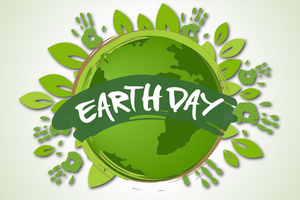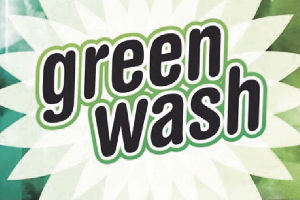Greenwashing Gomorrah
 I suspect the number of individuals aware of Earth Day's passing last month is in the minority. And, of those who may have been aware of its passing, I'd bet half my stuffed armadillo collection and two bottles of Wild Turkey that a substantially smaller subset of those actually participated in an Earth Day event. "And no... changing your car's motor oil in the middle of a gravel pit instead of over the sewer grate down the street from where you live does NOT qualify as an Earth Day event." Earth Day, in case you're not aware, is an annual worldwide celebration of events held on April 22nd each year which allows individuals an opportunity to demonstrate one's commitment to environmental protection. April 22nd, incidently, is just a mere two days after potheads celebrate four-twenty and NeoNazi's honour Adolph's birthday. Seems like lots of folk have reasons to celebrate in April.
I suspect the number of individuals aware of Earth Day's passing last month is in the minority. And, of those who may have been aware of its passing, I'd bet half my stuffed armadillo collection and two bottles of Wild Turkey that a substantially smaller subset of those actually participated in an Earth Day event. "And no... changing your car's motor oil in the middle of a gravel pit instead of over the sewer grate down the street from where you live does NOT qualify as an Earth Day event." Earth Day, in case you're not aware, is an annual worldwide celebration of events held on April 22nd each year which allows individuals an opportunity to demonstrate one's commitment to environmental protection. April 22nd, incidently, is just a mere two days after potheads celebrate four-twenty and NeoNazi's honour Adolph's birthday. Seems like lots of folk have reasons to celebrate in April.
In case you were curious about the "ton of exciting events [that were] lined up" in Ottawa this year, Earth Day Ottawa promoted a whopping three of them. First, the Canadian Museum of Nature offered free admission. I have no idea whether or not any special exhibits were featured for Earth Day, but I'd hope that they'd at least have offered free glass bottles of acid rain to the kids so they could take them home and water their mother's habiscus with. There's no substitute for solid scientific methodology when it comes to teaching children. Second, Terra 20, and don't even ask me who the hell they are or what they purport to do to save the planet, had "a day of fun, kid-friendly activities planned [for] the whole family." Apparently "composting worms" is all the rage and every child's ambition these days. Thank Christ I grew up in an era when we got chemistry sets for our birthdays or Christmas and we worked diligently to make volatile concoctions and blow shit up. And third, the Children's Museum, which is apparently housed within the Canadian Museum of History, featured an excursion through the International Village where, among other things, children could learn why the houses in Nigeria are made out of mud. Given that I spent the better part of seven years in West Africa, with most of my time spent in Nigeria, I'd venture a guess that it's because the only raw material dirt-poor people have access to is, in fact, dirt. I can't help but wonder if the little darlings were taught that the less fortunate West Africans don't even have mud huts. With *cough* such a delightful and wide variety of exciting events *cough* to choose from, *cough cough*, I'm thinking Earth Day, unlike Firecracker Day, won't leave long-lasting memories for the average child. "Quelle surprise... at least on Firecracker Day, you get to blow shit up!".

If there's a general lack of awareness or enthusiasm about things that might be good for the environment, it's likely seriously compounded by greenwashing: a tactic used by organizations and businesses to promote the perception that their products, objectives or policies are environmentally friendly. The term "greenwashing", in fact, when entered into any search engine will yield many examples of corporations who have put more money, time and energy into slick PR campaigns promoting their eco-friendly images, than they actually have in protecting the environment. Scot Case, TerraChoice Environmental Marketing VP, outlines a few of the tactics used by some companies to market their products in a short and informative video entitled The Six Sins of Greenwashing.
When was the last time you heard a cashier at a major grocery store ask, "Paper or plastic?" In fact, when was the last time you actually noticed paper bags, readily available, at the checkout at any of the major grocery stores? The local grocery store, where we often stop simply because it's convenient, will provide paper bags if you specifically ask for them. They always seem to have a small supply squirrelled away under the counter which, ironically, are free of charge. But when the cashier asks in a pleasant voice if you need bags, the only carrying vessel they're flogging is made of plastic and, at most retailers, will cost you a Canadian beaver. (That's $0.06 a bag when you factor in the HST here in Ontario.) Could it be that the only reason they're so horny to sell you that plastic bag isn't to deter you from using plastic, but rather, that the profit margin is more lucrative on greenwashed plastic bags than it is on free enviro-conscious paper bags? Surely you're not naive enough to believe that a plastic bag actually costs five cents to produce? Moreover, the bag you've just purchased, and are about to carry out of the store, is nothing short of a giant mothering billboard duly embossed with the store's logo. Let me see if I understand the logic here.... you're actually spending your money to facilitate the store's advertising? Doesn't that somehow seem exactly backwards? Given that Costco patrons are willing to pay an annual membership fee just for the privilege of shopping at Costco, it should not be surprising to find consumers willing to pay for plastic bags which actively advertise the business. If there were any truth in advertising, you'd see plastic bags adorned with "FOODWORLD - This customer's such a putz, they actually paid for the advertising on this environmentally caustic product. Meanwhile, the eco-friendly recycled paper bag WE paid for, remains under our counter. What a great world!" Of course something more succinct, like "You just got screwed", would work too.
Ask any cashier why the store is charging for plastic bags and take note of the varied responses you receive. "It's the government" is one you'll sometimes hear. "Really?", I ask. "Which government? The federal government, the province or the municipality?" Pointing the finger at government is not completely outlandish, however, given that Toronto's elflords did legislate a five cent surcharge on plastic bags back in June of 2009. I can't help but wonder if Hogtown's politicians were smoking crack back then too. "It's to encourage people to stop using plastic bags" other cashiers will tell you. "Really?," I respond, "Why don't you just use paper bags instead then?" That question generally elicits dropped jaws and leaves 'em speechless. You gotta love it when the light goes on.
The truth is, in most cases, a retailer's decision to provide paper or plastic (and whether or not to charge for them) is entirely discretionary. Make no mistake: retailers who charge for plastic bags under the guise of environmentalism are actively engaged in greenwashing. And, I'd argue, that those who charge for bags while offering no friendly alternative are profiteering. Granted, some retailers do donate a portion of the proceeds from the sale of their plastic bags to specific charitable organizations. The Bay, for instance, donates three cents from their sale to an HBC children's charity. Though marginally less offensive than retailers who simply pocket the proceeds from the sale of their plastic bags, it seems, nonetheless, rather self-serving to me. I applaud retailers like Giant Tiger who adopt a rational approach to bags: if you supply your own reusable bags they will actually pay you three cents a bag for having demonstrated your commitment to a greener planet. Now THAT, in my view, is not a greenwash. Unfortunately, I'm not aware of a single source or canonical list which outlines the plastic bag policies of Canadian retailers. Perhaps a motivated blogger will pick up the torch in an effort to shame self-serving retailers into a more rational and greener approach.
It's not that environmental concerns keep me awake all night long. I do recognize that, over the years, I've made some environmental blunders. Like the time I used my trusty jigsaw to cut a piece of plexiglass outside on the Workmate. I didn't think anything of it at the time. It wasn't until I noticed that a small gathering of birds had inadvertently mistaken the minute plastic slivers which had fallen to the ground as bird seed that I realized my faux pas. Mercifully, I won't do that again and I can only hope I don't go to ornithological purgatory for my environmental transgressions. "I'm sorry my little feathered buddies. If it's any consolation, I did feel awful for supplementing your diet with polypropylene. It won't happen again... honest!" That said, on the enviro-blunder scale, somehow I suspect that my eroneous bird seed oversight pales in comparison to the actions of an allegedly intoxicated oil tanker captain. If unintended environmental consequences seem, at times, hard to predict, what about those actions with intended consequences? What if it's our intention to be as environmentally conscientious as possible, but we're simply ignorant as to how to accomplish that goal?
Recently I posed two questions to Earth Day Canada whom I presumed to be an authority on environmental issues. My objective was to determine which, of two competing actions, would be the most environmentally sound. First, I wished to know if it is more environmentally friendly to use recycled paper towels in public washrooms or to use the forced air blow dryers powered by electricity. And, second, which is more harmful to the environment: the embalming fluids used in traditional burials? Or the carbon emissions from a cremation? Hannah Yakobi, Earth Day Canada's Communication Manager, was kind enough to write me back, however, I still do not have a definitive answer to either of my questions. With respect to drying one's hands in public washrooms, Hannah indicated that it "is complicated because it depends on where you live - so energy mix of community/province - and the type of recycled paper towel". (I thought about writing her back and telling her I've discovered a better way: go to the washroom with a friend, and while they're still standing at the urinal, dry your hands on the back of their shirt.) And in response to my second question pertaining to cadaver disposal, Hannah suggested that "eco-friendly funeral homes may have this answer". Sorry Hannah, I'm going to pass on that suggestion. I'm thinking a funeral home would be interested in selling me the package with the largest profit margin and not, necessarily, the one with the least impact on the planet.
One final note so there's no confusion about where my loyalties stand. I purchased a pre-arranged cremation from Cole Funeral Services on June 30th, 2010 but not because cremation may (or may not) be the most environmentally friendly way of dispatching my body. Nope, sorry, nothing so noble. The truth of the matter is that on July 1st, 2010 the Province of Ontario introduced the HST and I found no moral justice in the notion that the fuckers would bleed an additional 8% out of me... especially after I was dead.
Submitted by "Big Banana" Bob Loblaw, 30 June 2014